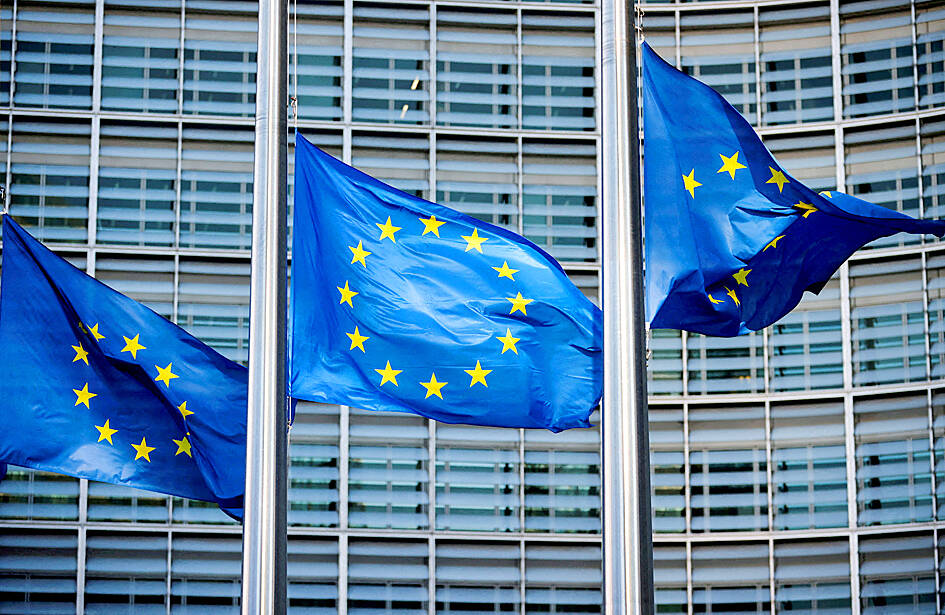EU states and lawmakers clinched a deal on Tuesday to expand Europe’s clean tech production, from solar and wind to carbon capture, as the bloc faces off with China and the US.
Brussels wants to reduce its reliance on China and make Europe more attractive for investment after the US unleashed a US$369 billion bonanza of clean technology subsidies last year.
The EU announced the plans last year, spurred by concerns the US program, which includes tax credits, would lure European manufacturers away.

Photo: Reuters
Belgium, which holds the rotating EU presidency, announced that negotiators had reached a provisional agreement. The European Commission wants at least 40 percent of green tech used in the EU to be produced in the bloc by 2030.
The law lists “strategic” technologies including nuclear energy as well as renewable energies like solar and wind.
The 40 percent target features in plans for a Net-Zero Industry Act to support the EU’s bid to become a carbon-neutral economy by 2050.
Under the law, public tenders would be weighed on criteria that could favor European companies, to counter similar moves by Beijing and Washington. The draft also seeks to make sure businesses can obtain permits faster. It is to enter into force after formal approval by EU states and the parliament.
“The most important thing is just to bring investment back to Europe and create a level playing field,” Solar First Inc’s European business chief Anja Lange said.
Access to clean tech — and avoiding an overreliance on imported technology — is a major source of concern in Europe, and many fear the draft law alone might not be enough to change the equation.
China dominates the solar power industry, and Europe’s solar panel manufacturers have made repeated pleas for help from Brussels, accusing Beijing of not playing fairly.
Last year, the EU opened a probe into Chinese electric car subsidies, and there are hopes among some in the industry that it will launch another investigation into Chinese solar panels.
However, European Commissioner for Financial Services Mairead McGuinness tamped down any such hopes on Monday, saying the bloc must carefully consider the impact of its actions.
“Any potential measure needs to be weighed against the objectives we have set ourselves when it comes to the energy transition,” she told lawmakers in Strasbourg.

The US dollar was trading at NT$29.7 at 10am today on the Taipei Foreign Exchange, as the New Taiwan dollar gained NT$1.364 from the previous close last week. The NT dollar continued to rise today, after surging 3.07 percent on Friday. After opening at NT$30.91, the NT dollar gained more than NT$1 in just 15 minutes, briefly passing the NT$30 mark. Before the US Department of the Treasury's semi-annual currency report came out, expectations that the NT dollar would keep rising were already building. The NT dollar on Friday closed at NT$31.064, up by NT$0.953 — a 3.07 percent single-day gain. Today,

‘SHORT TERM’: The local currency would likely remain strong in the near term, driven by anticipated US trade pressure, capital inflows and expectations of a US Fed rate cut The US dollar is expected to fall below NT$30 in the near term, as traders anticipate increased pressure from Washington for Taiwan to allow the New Taiwan dollar to appreciate, Cathay United Bank (國泰世華銀行) chief economist Lin Chi-chao (林啟超) said. Following a sharp drop in the greenback against the NT dollar on Friday, Lin told the Central News Agency that the local currency is likely to remain strong in the short term, driven in part by market psychology surrounding anticipated US policy pressure. On Friday, the US dollar fell NT$0.953, or 3.07 percent, closing at NT$31.064 — its lowest level since Jan.

The New Taiwan dollar and Taiwanese stocks surged on signs that trade tensions between the world’s top two economies might start easing and as US tech earnings boosted the outlook of the nation’s semiconductor exports. The NT dollar strengthened as much as 3.8 percent versus the US dollar to 30.815, the biggest intraday gain since January 2011, closing at NT$31.064. The benchmark TAIEX jumped 2.73 percent to outperform the region’s equity gauges. Outlook for global trade improved after China said it is assessing possible trade talks with the US, providing a boost for the nation’s currency and shares. As the NT dollar

The Financial Supervisory Commission (FSC) yesterday met with some of the nation’s largest insurance companies as a skyrocketing New Taiwan dollar piles pressure on their hundreds of billions of dollars in US bond investments. The commission has asked some life insurance firms, among the biggest Asian holders of US debt, to discuss how the rapidly strengthening NT dollar has impacted their operations, people familiar with the matter said. The meeting took place as the NT dollar jumped as much as 5 percent yesterday, its biggest intraday gain in more than three decades. The local currency surged as exporters rushed to